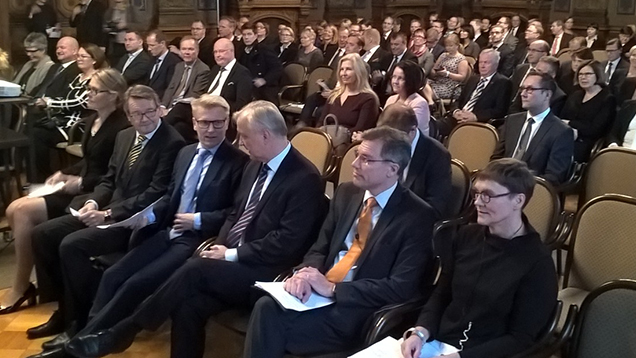The majority of energy use to be within the scope of Energy Efficiency Agreements

On 14 October 2016, Minister of Economic Affairs Olli Rehn and Minister of Agriculture and the Environment Kimmo Tiilikainen together with representatives from industries, the building and property sector, the municipal sector and the oil sector signed branch-specific agreements on new energy efficiency objectives for the 2017-2025 agreement period.
The agreements are a means of improving energy efficiency in different sectors with voluntary measures without enacting any new legislation. At this point 156 companies and 16 municipalities/joint municipal authorities have already agreed to join the agreements. When joining companies and municipalities commit to improving the efficiency of their energy use in order to achieve objectives they have set by 2025.
"Energy Efficiency Agreements are an important part of Finland's Energy and Climate Strategy and the primary means for promoting efficient use of energy. The energy efficiency of both our industrial sector and buildings is world class. Finland is also one of the rare EU Member States where this voluntary agreement procedure is effective and produces good results. The abundant participation by actors in this opportunity is a good sign that the new Energy Efficiency Agreement period beginning next year will be a success," stated Minister of Economic Affairs Olli Rehn.
"Energy Efficiency Agreements have made it possible for us to reduce regulation. It has been a joy to observe that in addition to the building and property sector, also the oil and biofuel sector as well as the agriculture sector have participated in long-term work to cut energy consumption and emissions," stated Minister of Agriculture and the Environment Kimmo Tiilikainen.
Hundreds of companies from industry, the energy and service sectors and the building and property sector as well as over a hundred municipalities are expected to join the Energy Efficiency Agreements. The objective is for these agreements to cover at least two-thirds of the overall energy use in Finland during the 2017-2025 agreement period.
Energy efficiency an important part of Finland's energy policy
Energy Efficiency Agreements play an important part in the realisation of Finland's Energy and Climate strategy, and are the primary means for promoting efficient use of energy in Finland. They are the chosen method of both the government and different sectors for fulfilling the binding energy efficiency objectives the EU has set for Finland. The energy saved as a result of these agreements is to cover over half of the binding energy savings target for 2014-2020 laid down in the EU's Energy Efficiency Directive (EED) for Finland.
The use of these agreements will speed up improved energy efficiency and support the mitigation of climate change and success in achieving national objectives for the use of renewable energy, as well as establish green growth and markets for cleantech solutions. The agreements will also increase Finland's security of supply and energy self-sufficiency.
Voluntary measures are effective - energy consumption drops by over 14 TWh a year
Hundreds of Finnish companies and communities have joined the Energy Efficiency Agreements in force until the end of 2016. The measures carried out by agreement parties in 2008-2015 resulted in energy savings amounting to 14 terawatt hours a year. This equals the overall annual energy use of 710,000 detached houses. The measures also resulted in an over 4 million ton annual cut in carbon dioxide emissions and the energy expense savings of 500 million euros for agreement participants.
A broad range of sectors take part in agreements
A broad range of sectors have committed to the 2017-2025 agreement period kicks off at the start of next year. The following actors have joined the agreements the Confederation of Finnish Industries EK, the Finnish Forest Industries Federation, the Finnish Food and Drink Industries’ Federation, the Finnish Energy Industries ET, the Finnish Commerce Federation, the Chemical Industry Federation of Finland, the Finnish Hospitality Association MaRa, the Technology Industries of Finland, the Association of Finnish Local and Regional Authorities, the Finnish Association of Building Owners and Construction Clients, the Finnish Petroleum and Biofuels Association. The Ministry of Employment and the Economy, the Ministry of the Environment and the Energy Authority are responsible for coordinating the agreements on behalf of central government. The practical implementation of the agreements will be supported by Motiva and, in the case of the oil sector agreement, the Oil Industry Service Centre Ltd and Lämmitysenergia Yhdistys ry.
Companies and municipalities that have joined the Energy Efficiency Agreements for the 2017-2025 agreement period: http://www.energiatehokkuussopimukset2017-2025.fi/sopimuksiin-liittyneet/
Additional information can be found at:
http://www.energiatehokkuussopimukset2017-2025.fi/
Further Information:
Chief Counsellor Pentti Puhakka, Ministry of Employment and the Economy, tel. +358 29 50 64 813, [email protected]
Senior Engineer Pia Outinen, Energy Authority, tel. +358 29 5050 087, [email protected]
Senior Environmental Counsellor Maarit Haakana, Ministry of the Environment, tel. +358 29 5250 069, [email protected]
Senior Adviser Kati Ruohomäki, Confederation of Finnish Industries EK, tel. +358 40 7675 684, [email protected]
Senior Advisor Tuomas Tikka, Finnish Forest Industries Federation +358 45 131 6683, [email protected]
Director Aija Tasa, RAKLI The Finnish Association of Building Owners and Construction Clients, tel. +358 50 3272 077, [email protected]
Energy Engineer Kalevi Luoma, Association of Finnish Local and Regional Authorities, tel. +358 9 771 2556, [email protected]
Deputy Managing Director Pekka Huttula, Finnish Petroleum and Biofuels Association, tel. +358 40 503 9465, [email protected]
